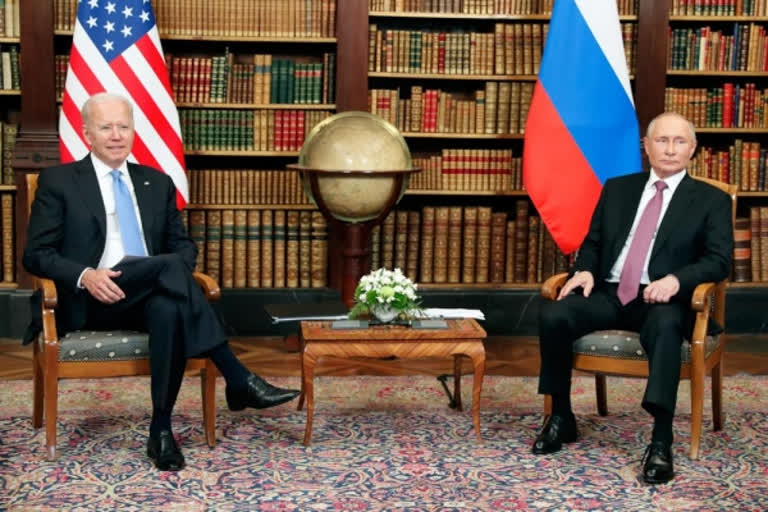Geneva: U.S. President Joe Biden and Russian President Vladimir Putin concluded their summit meeting Wednesday between what the American leader called “two great powers,” wrapping up more quickly than expected. The pair’s second sit-down, with aides present on both sides, lasted about 65 minutes.
That session was to be divided into two parts with a break in between, but concluded without a second part. The two sides had said they expected to meet for four to five hours but spent less than three hours together, including an opening meeting with just the two presidents and each one’s top foreign aide. Putin and then Biden were to hold press conferences before departing the summit site.
Biden and Putin plunged into the face-to-face talks Wednesday at a lush lakeside Swiss mansion, a highly anticipated summit at a time when both leaders say relations between their countries are at an all-time low.
Read:Face to face: Biden, Putin ready for long-anticipated summit
As the two leaders appeared briefly before media at the start of the meeting, Biden called it a discussion between “two great powers” and said it was “always better to meet face to face.” Putin said he hoped the talks would be “productive.”
The meeting in a book-lined room had a somewhat awkward beginning — both men appeared to avoid looking directly at each other during a brief and chaotic photo opportunity before a scrum of jostling reporters.
Biden nodded when a reporter asked if Putin could be trusted, but the White House quickly sent out a tweet insisting that the president was “very clearly not responding to any one question, but nodding in acknowledgment to the press generally.”
Putin ignored shouted questions from reporters, including whether he feared jailed Russian opposition leader Alexei Navalny.
The two leaders did shake hands — Biden extended his hand first and smiled at the stoic Russian leader — moments earlier when they posed with Swiss President Guy Parmelin, who welcomed them to Switzerland for the summit.
Biden and Putin first held a relatively intimate meeting joined by U.S. Secretary of State Antony Blinken and Russian Foreign Minister Sergey Lavrov. Each side had a translator for the session, which lasted about an hour and a half. The meeting, after about a 40-minute break, then expanded to include senior aides on each side. Biden and Putin were expected to meet for a total of four to five hours of wide-ranging talks.
For months, they have traded sharp rhetoric. Biden has repeatedly called out Putin for malicious cyberattacks by Russian-based hackers on U.S. interests, for the jailing of Russia’s foremost opposition leader and for interference in American elections.
Putin has reacted with whatabout-isms and denials — pointing to the Jan. 6 insurrection at the U.S. Capitol to argue that the U.S. has no business lecturing on democratic norms and insisting that the Russian government hasn’t been involved in any election interference or cyberattacks despite U.S. intelligence showing otherwise.
In advance of Wednesday’s meeting, both sides set out to lower expectations.
Even so, Biden said it was an important step if the United States and Russia were able to ultimately find “stability and predictability” in their relationship, a seemingly modest goal from the president for dealing with the person he sees as one of America’s fiercest adversaries.
“We should decide where it’s in our mutual interest, in the interest of the world, to cooperate, and see if we can do that,” Biden told reporters earlier this week. “And the areas where we don’t agree, make it clear what the red lines are.”
Putin’s spokesman, Dmitry Peskov, told The Associated Press on Wednesday that no breakthroughs were expected and that “the situation is too difficult in Russian-American relations.” He added that “the fact that the two presidents agreed to meet and finally start to speak openly about the problems is already an achievement.”
Arrangements for the meeting were carefully choreographed and vigorously negotiated.
